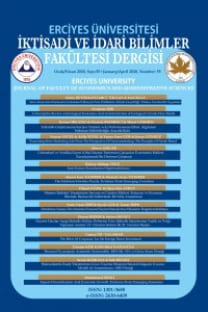DEVLETE GÜVEN VE MALİ YERELLEŞMENİN GÜVEN ÜZERİNDEKİ ETKİSİ
Güven, Sosyal Sermaye, Mali Yerelleşme
TRUST İN GOVERNMENT AND EFFECTS OF DECENTRALİZATİON ON TRUST
Trust, Social Capital, Fiscal Decentralization,
___
- Allison, P.D., (2000), Logistic Regression Using The SAS System, 2. Edition, Cary: SAS Institude.
- Bahl, R. (1999). Fiscal Decentralization as Development Policy. Public Budgeting & Finance, 19, 59-75.
- Berg, A.M. (2005). Creating Trust?: A Critical Perspective on Trust-Enhancing Efforts in Public Services. Public Performance & Management Review, 28:4, 465-486.
- Bhattacharrya, A.,Dunson, D.B., (2011), “Sparse Bayesian Infinite Factor Models”,Biometrika, 98, 291-306.
- De Mello, L.R. (2004). Can Fıscal Decentralızatıon Strengthen Socıal Capıtal?. Publıc Fınance Revıew, 32(1), 4-35.
- Dincer, O. (2010). Fiscal Decentralization and Trust. Public Finance Review, 38(2), 178-192.
- Engel, C., (ve) Ginderachter, J. V. (1993). Trends in Regional and Local Government in the European Community. Leuven/ Amersfoort: acco.
- Grootaert, C. (ve) Van Bastelaer (2002) Understanding and Measuring Social Capital: A MultiDisciplinary Tool for Practitioners. Washington:World Bank.
- Gujarati, D.N.(1999), Temel Ekonometri (Çev. :Ümit Şenesen, Gülay GünlükŞenesen) 1. Basım, İstanbul: Çevik
- Hayek, V. F. (1945). The Use of Knowledge in Society. American Economic Review , 35(4), pp. 519- 530.
- Kara, Ö. K. (2019). Mali Yerelleşmenin Başarı Şansı ve Etkinliği Tartışmaları. Sosyoekonomi, 27(40), 165-184.
- Karabacak, B.N. ve Karabacak, Y. (2014). Mali Yerelleşme Teorilerinin Temel Yerel Gelir Türlerine Bakışı. Ç.Ü. Sosyal Bilimler Enstitüsü Dergisi, 23(1) 251-266
- Kim, S., Lee, Y. (ve) Kim, T. (2020). The relationship between fiscal decentralization and trust in government: evidence from the South Korean case. International Review of Administrative Sciences.
- Ligthart, J. E. (ve) Van Oudheusden, P. (2015). In government we trust: The role of fiscal decentralization. European Journal of Political Economy, 37, 116-128.
- Lockwood, Ben (2005). Fiscal decentralization : a political economy perspective. Working Paper. Coventry: University of Warwick, Department of Economics. Warwick economic research papers (No.721).
- Mauro, L. (ve) Pigliaru, F. (2013). Decentralization, Social Capital and Regional Convergence. FEEM Working Paper No. 57.2013.
- Musgrave, R. (1969). Theories of Fiscal Federalism. Public Finance, 24(4), 521– 32.
- Musgrave, R. A (1971) Economics of Fiscal Federalism. Nebraska Journal of Economics and Business , 10(4), 3-13
- Musgrave,R.,The Theory of Public Finance,McGrraw-Hill, New York, 1959.
- Oates, W.E., 1972. Fiscal Federalism. Harcourt Brace Jovanovich,New York
- Oates, W. E., 1993. Fiscal Decentralization and Economic Development. National Tax Journal, National Tax Association, 46(2), 237-243
- Oates, W.E. (1999). An Essay on Fiscal Federalism. Journal of Economic Literature, 37(3), 1120-1149. OECD. (2013). “Trust in Government.” In Government at a Glance 2013. Paris: OECD Publishing.
- Porcelli, F. (2009). Fiscal Decentralisation and Efficiency of Government, A Brief Literature Review, Erişim adresi https://citeseerx.ist.psu.edu/viewdoc/download?doi=10.1.1.232.4919&rep=rep1&type=pdf.
- Qibthiyyah, R. M., Zen, F. (ve) Ledi, T.& Dita, A. (2011). Decentralization and Social Capital in Indonesia. MPRA Paper 95857, University Library of Munich, Germany.
- Rondinelli, D. (1999) What is Decentralization, Litvack, J. & Seddon, J. (Eds.),"Decentralization Briefing Notes", World Bank Institute, The World Bank Working Paper,1999.
- Salman, A. Iqbal, N (2011). Social Capital and Fiscal Decentralization. Pakistan Journal of Social Sciences (PJSS), 31(2), 407-421.
- Tanny, T. F. (ve) Al-Hossienie, C. A. (2019). Trust in Government: Factors Affecting Public Trust and Distrust. Jahangirnagar Journal of Administrative Studies, Department of Public Administration, 12, 49-63.
- Tatoğlu, F.Y., (2013), İleri Panel Veri Analizi, Stata Uygulamalı, Beta Yayınevi, İstanbul.
- Tiebout, C.,M. (1956). A Pure Theory of Local Expenditures. Journal of Local Expenditures, LXIV(5), 416-424.
- Tiebout, C.M. (1956). A Pure Theory of Local Expenditures. Journal of Political Economy, 64, 416- 424.
- Vazquez, J. (ve) McNab, R.M. (2001). Fiscal Decentralization and Economic Growth, Working Paper 01-1, Georgia State University.
- Weingast, B.R. (1995). The Economic Role of Political Institutions:Market Preserving Federalism and Economic Development. Journal of Law, Economics and Organizations, 15(1),1-31.
- Yılmaz, H.H., Emil, M.F., Kerimoğlu, B., (2017), Yerel Yönetimler Maliyesi, PYB Kurumsal Yönetim, Planlama ve Proje Danışmanlık, Ankara.
- Yin, R. K. (ve) Lucas, W. A. (1973). Decentralization and Alienation. Policy Sciences , 4(3), 327-336.
- ISSN: 1301-3688
- Yayın Aralığı: 3
- Başlangıç: 1981
- Yayıncı: -
DEVLETE GÜVEN VE MALİ YERELLEŞMENİN GÜVEN ÜZERİNDEKİ ETKİSİ
YEŞİLE BOYAMA VE YEŞİL SATIN ALMA DAVRANIŞI: ÇEVRESEL AÇIDAN SÜRDÜRÜLEBİLİR BİR BAKIŞ AÇISI
Sinan ÇAVUŞOĞLU, Bülent DEMİRAĞ
MERKEZ BANKASI DİJİTAL PARA SİSTEMİNİN AVANTAJ VE DEZAVANTAJLARI NELER OLABİLİR?
Can Efecan AKHAN, Erkan ÖZDEMİR
RÜZGÂR ENERJİSİ ÜRETİMİ VE EKONOMİK BÜYÜME İLİŞKİSİ: AB-15 ÜLKELERİ İÇİN BİR PANEL VERİ ANALİZİ
Yunus Emre BİROL, Bünyamin DEMİRGİL
Öznur ARSLAN, Mesut POLATGİL, Ebuzer ARSLAN
OTANTİK LİDERLİK VE GİRİŞİMCİLİK EĞİLİMLERİ İLİŞKİSİNDE ÖZ YETERLİLİK ALGISININ ARACILIK ETKİSİ
